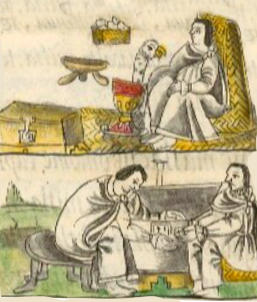mocuiltono (FCbk10f27v)
This iconographic example, featuring a rich man (mocuiltono, or mocuiltonoh, with the glottal stop), is included in this digital collection for the purpose of making comparisons with related hieroglyphs. The term selected for this example comes from the text on the page previous to the image in the Digital Florentine Codex. There is no gloss, per se. This example shows a man seated on a high-back woven seat (icpalli), with considerable personal goods or property (tlatquitl) in front of him, including a large, highly decorated, red and gold cup (a tecomatl or a tecontapayolli, in the DFC keywording) and a turkey (totolin or huexolotl). He shares the floor with a wooden chest (toptli), and in the air in front of his face is a tripod mortar or sauce bowl (molcaxitl) and what may be a woven box (petlacalli), possibly containing eggs. As with so many Nahua men in this codex–from an urban setting–this elite man is dressed in white cotton trousers and a long-sleeve shirt, all covered with a cloak (tilmatli). The clothing is shaded for three-dimensionality, showing European artistic style influences.
Stephanie Wood
The contextualizing image shows another rich man in a more negative view, and he is in a possible commercial transaction with another man. The rich man has a single peso coin he is apparently offering, perhaps in a thrifty way. This is a peso, given the cross on it.
Stephanie Wood
Mocuiltono
mocuiltono
Stephanie Wood
1577
Jeff Haskett-Wood
mocuiltonoani, el hombre rico, la persona rica, molcajete, huevo, comida, guajolote, caja de madera
mocuiltono, a rich person, https://nahuatl.wired-humanities.org/content/mocuiltono
el rico
Stephanie Wood
Available at Digital Florentine Codex/Códice Florentino Digital, edited by Kim N. Richter and Alicia Maria Houtrouw, "Book 10: The People", fol. 27v, Getty Research Institute, 2023. https://florentinecodex.getty.edu/en/book/10/folio/27v/images/0 Accessed 10 September 2025.
Images of the digitized Florentine Codex are made available under the following Creative Commons license: CC BY-NC-ND (Attribution-NonCommercial-NoDerivs 4.0 International). For print-publication quality photos, please contact the Biblioteca Medicea Laurenziana ([email protected]). The Library of Congress has also published this manuscript, using the images of the World Digital Library copy. “The Library of Congress is unaware of any copyright or other restrictions in the World Digital Library Collection. Absent any such restrictions, these materials are free to use and reuse.”




